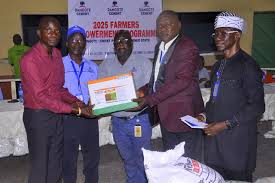Dangote Cement Plc has introduced a new Farmers Empowerment Programme in Gboko, Benue State, targeting 50 local farmers to boost food production and improve livelihoods. The initiative, launched in collaboration with local communities, is part of the company’s commitment to supporting Nigeria’s food security goals while expanding its social investment footprint.
The programme, according to Dangote Cement, will assist selected farmers to cultivate both subsistence and commercial crops in larger quantities. Beneficiaries will receive essential agricultural inputs including fertilisers, agrochemicals, knapsack sprayers, and a variety of seedlings, giving them the tools needed to improve crop yield and profitability.
Speaking during the official flag-off of the programme, General Manager, Social Performance at Dangote Cement, Johnson Kor, described the initiative as “historic and innovative”. He explained that the 50 beneficiaries were carefully chosen from six catchment areas within the company’s host communities in Gboko Local Government Area, Benue State.
Kor said the move is part of Dangote Cement’s ongoing social performance strategy, designed to uplift rural livelihoods and support the government’s agricultural transformation agenda. “This programme is not just about giving; it’s about building capacity and enhancing productivity,” he added.
Plant Director of Dangote Cement, Gboko Plant, Munusamy Murugan, also addressed attendees at the launch, stating that the company plans to make the initiative an annual intervention, with room to expand and adjust based on feedback from local communities. “We see this as a long-term investment in our host communities. Agriculture remains key to sustainable development, and we are committed to supporting it in practical ways,” Murugan said.
The launch in Gboko follows closely after another empowerment scheme by the company which provided cash grants to businesswomen in the host communities and increased bursary payments to local students by over 100 percent.
Additional community development plans are also in the pipeline, including a Youth Empowerment Programme aimed at offering vocational training in welding, fabrication, and solar electrical installation. These initiatives underscore Dangote Cement’s broader Corporate Social Responsibility (CSR) agenda aimed at fostering economic empowerment in its operational areas.
Dr Ahemen Samuel, a representative from Abbass Corporate Services and consultant for the project, called on the selected farmers to take full advantage of the opportunity, noting its potential to transform them from small-scale farmers into agro-entrepreneurs. “This programme is a gateway to long-term income generation and self-reliance in agriculture. We encourage all beneficiaries to see it as a platform for growth and impact,” he said.
One of the community members, Kwaghgba Isaac, commended Dangote Cement for what he described as a “historic and significant intervention”. According to him, the empowerment initiative will not only boost local food production but also reduce poverty in the region. “This programme has come at the right time. It will help many families produce more food and earn better incomes. We thank Dangote for remembering the grassroots,” he said.
Agriculture plays a vital role in the economy of Benue State, often referred to as Nigeria’s food basket. However, many local farmers struggle with access to modern farming tools, inputs, and funding, limiting productivity and income. By stepping in with targeted support, Dangote Cement is contributing to a more resilient agricultural sector while strengthening its relationship with host communities.
With the nation facing rising concerns over food inflation and insecurity, interventions like this are seen as timely steps toward sustainable agriculture. The company has indicated that it will continue to work closely with local leaders, stakeholders, and experts to ensure that the programme achieves its intended outcomes and serves as a model for similar initiatives in other regions.
